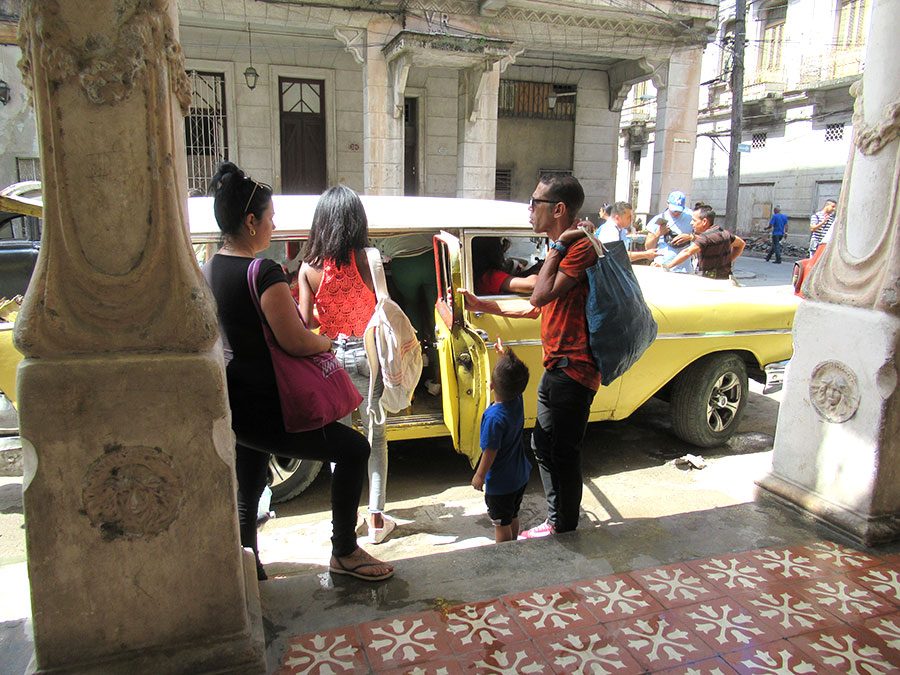NVU Cuba trip planned for February break 2019
Catching a cab in Havana
Over the 2019 February break at Northern Vermont University, students will have the chance to travel to Cuba for an immersive arts and cultural experience like no other.
Professor Tyrone Shaw, associate professor of the Writing and Journalism department, and Professor Ken Leslie, professor and chair of the Fine Arts department, will lead the trip, which is part of INT-3050, The Art and Culture of Cuba.
“Ken Leslie and I work together in perfect harmony for a multimedia experience,” said Shaw. “We want anybody who is interested in creative expression to join us.”
The trip requires no prerequisites and will be about 8 days in length, depending upon flight schedules from Montreal. Shaw and Leslie have arranged and led this Cuba trip three times since the first trip in 2012.
Shaw said the trip exposes students to a variety of aspects of Cuban art and culture, noting that he and Leslie have been developing new contacts with each trip. “We’ve worked very hard to get connected to the contemporary arts and music and entertainment scene there,” said Leslie.
Leslie and Shaw said that each visit to Cuba has been different, each time featuring new locations and experiences. While an itinerary exists, logistics are sometimes unpredictable, which presents both challenges and delights.
“In Cuba, there are always surprises,” said Leslie.
Past trips have featured a visit to an alligator farm, a tour of the Bay of Pigs, a Flamenco ballet performance at the National Theater, many museum visits, a morning spent at Cuba’s premier secondary-school art academy during which Leslie hosted a book making workshop, a visit to a Cuban newspaper, visits to numerous private galleries, and a variety of performance venues featuring great Cuban bands and performance artists.
Unfortunately, this past year’s Cuba trip had to be canceled for lack of sufficient enrollment.
“We’re doing everything we can to be sure that this time the trip enrolls because this is the most fantastic study-travel class you could imagine,” said Shaw.
According to Shaw, this trip will feature some new experiences, including a two-day trip to a mountain village called San Diego, which is right alongside a huge national park. This town features a hot spring and spa, where students will be able to enjoy the full Cuban spa experience, including a mineral bath and a modest but pleasant hotel. This town also boasts a thriving organic agricultural cooperative. Half a day will be spent on the farm, touring what Shaw calls “the new face of Cuban agriculture.” “While in the village, Professor of Economics Rafael Betancourt, who visited JSC in October 2017, will also host an informal presentation on the politics and economy of Cuba at his home.
This trip will also offer visits to the studios of some famous artists that were not open to the public during past class trips. There will be theater and museums visits, leisurely walking tours through the city and along the waterfront of Havana, and a short ferry trip across Havana Bay to Regla island.
As with past visits, instead of hotels the group will be staying in casa particulars, which are like American B&Bs, owned and hosted by Cubans entrepreneurs.
“This trip, above anything else, is an experience of discovery, and Cuba has a lot to discover, starting in Havana,” said Shaw. “This is a country in the midst of a very interesting and perhaps unique transition, caught between the Castro past and an uncertain future. It’s a time of both hope and frustration.”
Shaw stresses that the three-credit course has serious academic work accompanying it, beginning with a reading list and a variety of films related to Cuban culture and history, as well as classes before and after the trip.
Each student’s time in Cuba directly experiencing the island’s rapidly changing culture will culminate in individual class presentations, which can take almost any form, such as a collection of poems, paintings, drawing, photography, videos or music.
During the trip, Shaw says ample time will be provided for independent field research, during which students are encouraged to explore aspects of Cuban life particularly relevant to their individual projects.
The trip costs $2,100, which covers all expenses, including travel and plane tickets, health insurance in Cuba, museum and event entry fees, meals and housing.
Shaw said that anyone interested in the arts, sciences, politics, economics and social sciences are welcome and encouraged to join the trip. “We guarantee an incredibly enriching experience, whatever your discipline,” said Shaw.
“One of my favorite aspects of that trip is watching people’s minds get blown when they get to Cuba,” said Shaw. “Seeing the amazement a delight on their faces, and the confusion, is a great experience.”
Those with any interest in the February 2019 trip are urged to contact either Leslie or Shaw.




